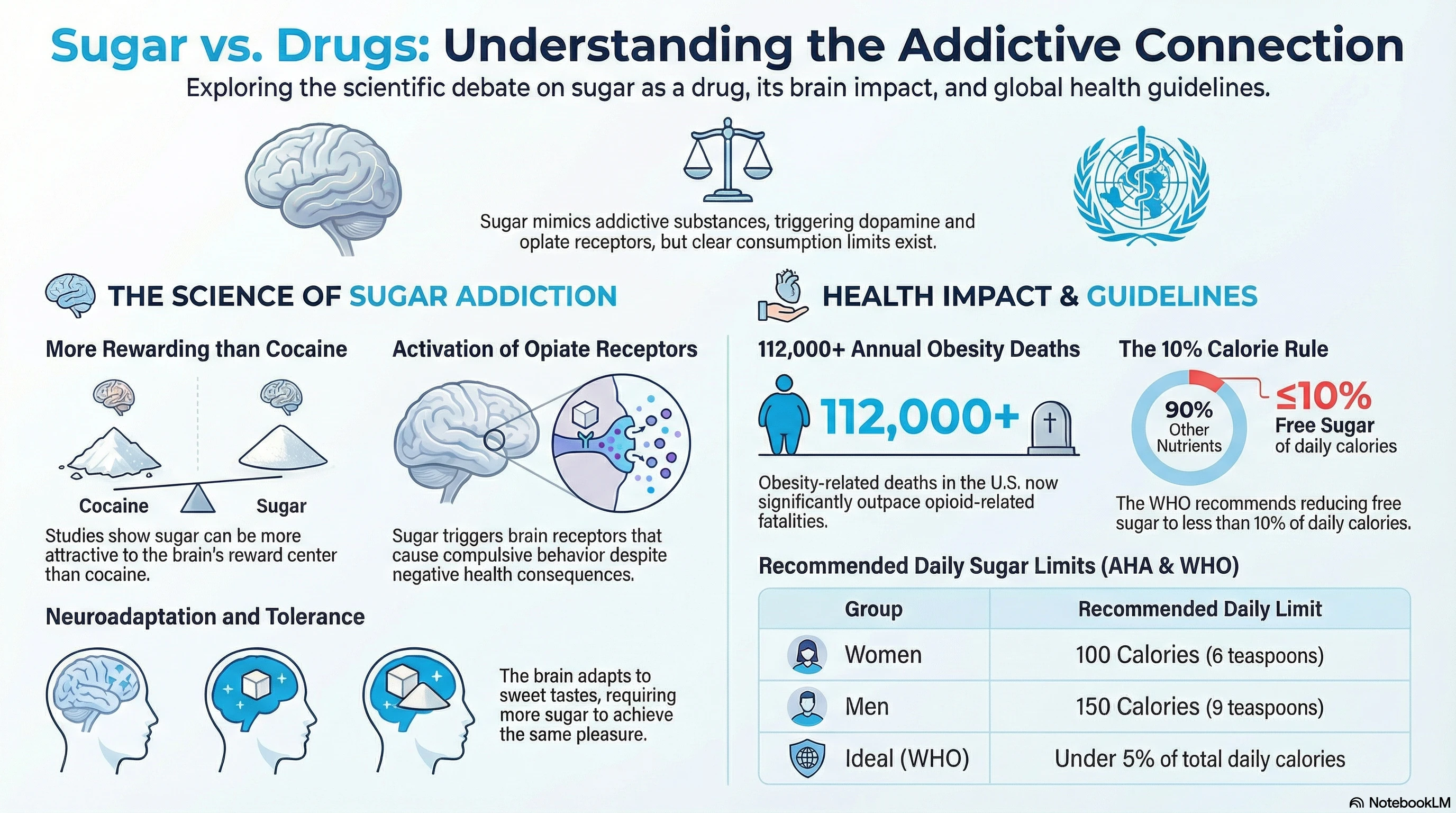Sugar: Is it Time to Label it as a Dangerous Drug?
Explore the debate on 'Is sugar a drug?' and its addictive properties that impact the brain and health.
The Debate on Sugar Addiction
The question, "is sugar a drug?", has been a topic of controversy and debate in recent years. This is largely due to the potential addictive properties of sugar, as well as its impact on health and wellbeing.

Neuroadaptations and Overeating
Excessive consumption of sugar may lead to neuroadaptations in the brain's reward system. This could potentially result in compulsive overeating and decoupling eating behavior from caloric needs, leading to adverse health conditions like obesity, metabolic syndrome, and inflammatory diseases.
The theory suggests that the brain adapts to the intense stimulation of the sweet taste by reducing its response, causing individuals to consume more sugar to achieve the same level of reward or satisfaction. This cycle of consumption and adaptation can ultimately lead to overeating and the associated health risks.
Evidence in Humans vs. Animals
While there is substantial evidence from animal studies to suggest that sugar can induce addiction-like behaviors, the evidence for sugar addiction in humans is less conclusive. Research indicates that addiction-like behaviors, such as binge eating, may only occur in the context of intermittent access to sugar. These behaviors likely arise from intermittent access to sweet tasting or highly palatable foods, not the neurochemical effects of sugar [2].
This suggests that the behavioral context may play a significant role in the development of these behaviors, and that the role of sugar as a 'drug' may be overstated. However, further research is necessary to fully understand the implications of sugar consumption on human health and behavior. The debate on sugar addiction continues, with experts differing in their views on the addictive properties of sugar and its classification as a 'drug'.
Sugar's Impact on the Brain
The question, "is sugar a drug?" might seem extreme, but the scientific evidence pointing towards the addictive properties of sugar provides a compelling argument. The impact of excessive sugar consumption on the brain's reward system and opiate receptors underlines this potential for addiction.
Activation of Opiate Receptors
Research indicates that sugar activates opiate receptors in the brain, leading to a reward response that can trigger compulsive behavior. This behavioral pattern is similar to addiction as it continues despite negative consequences like weight gain and hormone imbalances.
Moreover, excessive sugar consumption can result in neuroadaptations within the reward system. This can decouple eating behavior from caloric needs, leading to compulsive overeating and subsequent adverse health conditions including obesity, metabolic syndrome, and inflammatory diseases.
This activation of the opiate receptors and its resultant effects echoes the influence that addictive drugs have on the brain, further supporting the argument that sugar may be considered a drug.
Reward Center Effects
The activation of reward centers in the brain by sugar consumption is another key factor to consider. As per a study from Connecticut College, Oreo cookies activated more neurons in the pleasure center of rats' brains than cocaine. This illustrates the potent rewarding effects of sugar, suggesting its addictive nature.
Further research from scientists in France found that the rewards experienced by the brain after consuming sugar are even "more rewarding and attractive" than the effects of cocaine. This indicates the powerful impact that sugar can have on the brain's reward system, akin to the activation of reward pathways caused by drugs [3].
The consumption of sugary foods and drinks, therefore, triggers the brain's reward system, creating a pleasurable sensation. This activation can lead to cravings and potential addiction, which is a process similar to how drugs activate the reward pathways in the brain [4].
In essence, the way sugar interacts with the brain's opiate receptors and reward centers underscores its potential addictive properties, providing a solid foundation for the argument that sugar is indeed a drug.
Sugar's Addictive Properties
In the ongoing debate surrounding the question "is sugar a drug?", the addictive properties of sugar play a significant role. From neuronal activation by popular foods like Oreo cookies to similarities between sugar and cocaine rewards, we delve into the science behind sugar's potential addictive nature.
Neuronal Activation by Oreo Cookies
In a study conducted by Connecticut College, it was found that Oreo cookies activated more neurons in the pleasure center of rats' brains than cocaine did. This indicates the powerful rewarding effects of sugar and its potential to stimulate addictive behaviors.
The neuronal activation triggered by sugar consumption is part of the brain’s reward system, the same system that is activated by addictive drugs. This activation process creates a pleasurable sensation that can lead to cravings and potential addiction, further solidifying the parallels between sugar and drug addiction.
Comparison to Cocaine Rewards
Further evidence of sugar's addictive nature comes from a study conducted in France. The researchers found that the rewards experienced by the brain after consuming sugar are even "more rewarding and attractive" than the effects of cocaine [3].
The brain's reward system can be activated by various substances, including drugs and sugar. Dopamine, often described as the currency of the reward system, plays a crucial role in addiction. Addictive substances, including sugar, tend to activate dopamine receptors in the brain, leading to addictive behaviors and cravings.
In summary, while sugar may not be classified as a drug in the traditional sense, the scientific evidence suggests that its effects on the brain's reward system and dopamine receptors are similar to those of addictive substances. This raises important questions about our consumption patterns and the potential health risks associated with excessive sugar intake.
Health Recommendations on Sugar Intake
Given the rising concerns about sugar's potential addictive properties, it's important to understand the health recommendations regarding sugar intake. These guidelines help ensure individuals maintain a balanced diet and mitigate the risk of health complications associated with excessive sugar consumption.
World Health Organization Guidelines
The World Health Organization (WHO) advises that the daily intake of free sugar should be reduced to less than 10% of total calorie intake. Furthermore, the WHO suggests a further reduction to less than 5% of daily calorie intake, equivalent to about 6 teaspoons of sugar, to reduce the risk of obesity, tooth decay, and being overweight.
This recommendation aligns with the WHO's broader efforts to address non-communicable diseases and promote healthier diets around the world.
Dietary Guidelines and Added Sugars
Alongside the WHO, various other health organizations have provided guidelines on added sugar intake. The Office of Disease Prevention and Health Promotion's 2015-2020 Dietary Guidelines recommend cutting consumption of added sugars to less than 10% of total daily calories. The majority of added sugars in an average person's diet come from beverages and snacks [3].
The American Heart Association (AHA) advises that women should consume no more than 100 calories (about 6 teaspoons or 24 grams) of added sugar per day. Conversely, men should consume no more than 150 calories (about 9 teaspoons or 36 grams) of added sugar per day. The AHA further recommends limiting daily intake of added sugar to approximately 4.5% to 6.5% of total calories.
These guidelines serve to reinforce the concept of moderation in sugar intake and highlight the importance of understanding the nutritional content of what we consume daily. While the question of 'is sugar a drug?' continues to be debated, these guidelines provide a crucial framework for managing sugar consumption and promoting better health outcomes.
Understanding Sugar and Dopamine
One of the key components in the "is sugar a drug?" debate involves understanding the role of dopamine, a neurotransmitter in the brain linked to pleasure and reward, in addiction processes.
Role of Dopamine in Addiction
Dopamine, often described as the currency of the reward system, plays an instrumental role in the mechanism of addiction. Addictive substances, including sugar, tend to activate dopamine receptors in the brain. Such activation leads to addictive behaviors and cravings, reinforcing the cycle of consumption and reward.
The reward system in the brain is not only activated by food but also by various other factors like social interactions and it plays a substantial role in addictions to drugs, gambling, and video games. Overactivation of this reward system can lead to increased cravings and tolerance to substances, requiring more to achieve the same pleasure [4].
Imbalance and Cravings
Consuming sugary foods and drinks can trigger the brain's reward system, creating a pleasurable sensation that can lead to cravings and potential addiction, similar to how drugs can activate the reward pathways in the brain.
Moreover, excessive sugar consumption may trigger neuroadaptations in the reward system, leading to compulsive overeating and decoupling eating behavior from caloric needs. This can result in adverse health conditions like obesity, metabolic syndrome, and inflammatory diseases [1].
Excessive consumption of sugar can also lead to an imbalance in the dopamine response, resulting in increased cravings, the need for more sugar, and the potential for addiction [4]. To avoid these potential addictive behaviors, it is advised to eat sugar in moderation and adhere to recommended guidelines for daily sugar intake.
Health organizations such as the Office of Disease Prevention and Health Promotion, the World Health Organization, and the American Heart Association have provided guidelines for the maximum intake of added sugars per day. Adhering to these guidelines can help prevent the adverse health effects of excess sugar consumption, such as obesity and cardiovascular disease.
Sugar Consumption in the US
In the United States, sugar consumption has become a significant concern due to its potential addictive properties and the subsequent health impact. The role of sugar in the obesity epidemic and its influence on public health and the scientific community is a topic of ongoing discussion.
Obesity Epidemic and Health Costs
The Centers for Disease Control and Prevention (CDC) estimates that the U.S. is experiencing an obesity epidemic due to sugar consumption, resulting in premature deaths and billions of added healthcare costs to manage diabetes, heart disease, and obesity-induced joint destruction [7]. According to the CDC, annually, between 112,000 and 365,000 deaths are attributable to obesity, representing 3-4 times more deaths than opioid-related deaths in the U.S..
This statistical data indicate the pervasive nature of the obesity problem, raising the question: 'is sugar a drug?'
Manipulation of Science and Industry Influence
Added sugar consumption in the United States reached its peak in 2000, representing 17.9% of total energy intake (98.6 g) for the entire population. The most recent analysis using National Health and Nutrition Examination Survey data for 2007–2008 indicates that the average added sugar intake decreased to 14.5% of total energy for the entire population but that it remains high for certain age groups.
The major source of added sugar in the American diet is derived from commercially sweetened products, including calorically sweetened beverages, grain-based desserts, dairy desserts, syrups, and candy as well as ready-to-eat cereals for children. For all age groups, sweetened beverages (regular soda and energy, sports, and fruit drinks) are consistently the largest contributor of added sugar to the diet [6].
There is a call for governmental intervention and the enforcement of added sugar labeling to protect and inform consumers. The argument is that the government can currently require more information pertinent to total sugar consistent with the public health literature and scientific methods necessary for enforcement. The time has come that added sugar labeling can also be enforced and should seriously be considered by the government to protect and inform consumers.
This push for transparency in sugar labeling underscores the growing concern over the role of sugar in public health and raises further questions about the potential addictive nature of sugar, its impact on the brain, and whether it should be considered a dangerous drug.














.svg)








